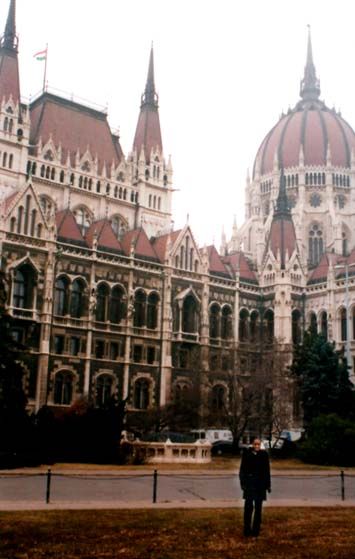Would You Believe Budapest?

Monday, February 4, 2002 |
||||||||||||
| Greetings,
For those of you who don't know, I have come to Budapest for a week to attend a conference with teachers and teacher trainers from various parts of the former Soviet Union. The purpose of the conference is to discuss how one teaches democracy in newly emerging states. I am here with a colleague, Nikole Smith, and our role is to learn what problems the conference raises and then, when we return, to develop lesson plans for American teachers to help them teach about these issues of new democracies. This is the second week of the conference. Last week there were teams of three from Poland, the Chech Republic, Moldavia, Croatia Estonia, and Lithuania. This week it is Armenia, Azerbaijahn, Kajakstan, Uzbekistan, Russia and Ukraine. This spring all twelve groups of three will expand to groups of ten and all 120 guests will come to the US for three weeks. The whole program is sponsored by the US Department of Education. I am not sure where they get the money, but I can say that the people here are a mighty impressive group, and I am flattered to be among them. Our conference started this afternoon. We sit with headphones and enjoy simultaneous translation of all the larger sessions, but sequential translation is necessary when we are in small groups. I feel sorry for the group from Armenia -- they are all bilingual so they have to translate a lot for the small groups. In fact many of the Europeans speak English, but the translation is good because there are subtleties in the text when you are discussing a topic like democracy and it's not the kind of conversation where just any word will do. We are staying a a beautiful conference center, complete with a bank of computers and a swimming pool, on the outskirts of Budapest. This is Central European University, built with money from the Soros foundation.
Yesterday Nikki and I arrived and spent one night in Budapest, enjoying the sights and the lights and having dinner with Luiz, a slightly crazy friend of a friend who has moved here and does an all-night radio show on the English channel.
One aspect of Budapest we noticed last night were buildings that are still full of bullet holes -- probably from 1956, but possibly from World War II -- it's hard to say.
Budapest has changed since I was here in 1989, but not as dramatically as one might think. There are McDonalds, Burger King and Wendy's, and a rather dilapadated clothing store named Chippendales, but there don't appear to be the high fashion names that you would find in Western Europe. Our host last evening says that the middle class -- teachers, police, etc. are really struggling between low wages and high taxes and that many are trying to make do by selling their apartments to foreigners, mainly Germans. The anticipation is that when Hungary joins the EU, Budapest will be dominated with German businesses. We rarely saw a sign or a menu, etc. that was translated into English without also being translated into German. Nikki and I are the only practicing teachers here this week, although tehre were a few others in last week's group. Virtually everyone else works for an NGO -- a non-profit organization involved with publishing materials or developing curriculum training. Some have been involved with Eastern Bloc countries for some time.The Constitutional RIghts Foundation has five people and a board member here, but it seems odd that there is no one from any American state's department of education, although there is someone who works for the 50 state superintendents. Perhaps I will understand better tomorrow. We only started this afternoon at 3:00, so there is much more to come. | ||||||||||||

| |
The Chain Bridge





